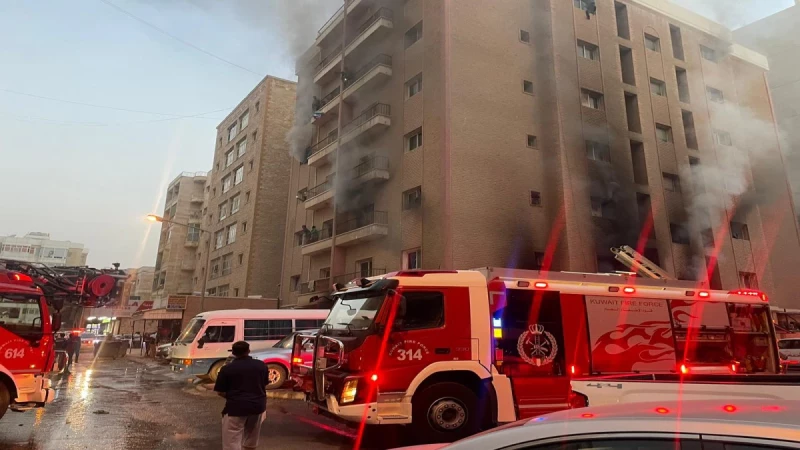Latest News
- Kuwaiti Woman Beaten To Death
- Kuwait Ready For Massive Crackdown On Visa Violators
- Kuwait Airport Terminal 2 Project Gains Momentum
- Workers Union In Health Calls For Flexible Fingerprinting System
- Kuwait Railway Project Consultancy Bids
- 90 E-Newspaper Licenses Withdrew Amid Crackdown
- Al-Zour Refinery Fire Brought Under Control
- MoH Shuts Down Private Dentistry Center, Bans One-Day Cosmetic S...
- Severe Shortage Of National Medical Personnel In Kuwait
- Traffic Department Deploys High-tech Cameras To Tackle Rising Tr...
- Major Fire Breaks Out In Shuaiba Industrial Area Warehouse
- Assault And Property Damage On 7th Ring Road
Mangaf Fire Sparks Urgent Call For Workers’ Cities

In the wake of the tragic Mangaf fire that claimed the lives of several workers due to overcrowded living conditions, the longstanding issue of workers’ cities has once again taken center stage in Kuwait. This incident has reignited calls for urgent action to address the housing needs of bachelor expatriate workers and alleviate overcrowding in residential areas, reports Al-Anba Daily.
Over the years, various authorities have stressed the necessity of establishing workers’ cities to provide adequate living conditions, essential services, and recreational amenities for workers. Despite initial plans being prepared by the Ministry of Public Works and other relevant agencies three years ago, progress towards implementation has been slow, leaving the project in the preparatory stages.
The issue gained further attention during the COVID-19 pandemic when movement restrictions highlighted the challenges faced by factories and companies whose workers were unable to access their workplaces due to residing in restricted areas. At that time, authorities underscored the urgency of constructing workers’ cities, yet the momentum waned as the pandemic receded until the Mangaf fire refocused attention on the issue.
Plans for six integrated workers’ cities, equipped with comprehensive services including healthcare, security, and recreational facilities, have been ready for years. These cities aim to relocate single workers from densely populated residential areas and enhance their living standards. Despite being earmarked for various governorates with designated sites and capacities, actual construction has not commenced.
Recently, Kuwait Municipality announced the initiation of the first labor city project in South Jahra, spanning over 1,015,000 square meters. This project, set for public-private partnership investment, will accommodate up to 20,000 bachelor workers from diverse nationalities. It will include residential complexes alongside essential services such as shops, mosques, playgrounds, and medical clinics, ensuring all infrastructure needs are met.
The establishment of workers’ cities is seen as crucial not only for providing adequate housing but also for easing traffic congestion in residential areas and enhancing overall public services. With the urgency underscored by recent events, Kuwait is urged to expedite the implementation of workers’ cities to safeguard the welfare and safety of its expatriate workforce.
Trending News
-
 Kuwait Lifted The Ban On Filipino Workers
23 June 2024
Kuwait Lifted The Ban On Filipino Workers
23 June 2024 -
 2 Hours Power Cut In Multiple Areas Of Kuwait Betw...
20 June 2024
2 Hours Power Cut In Multiple Areas Of Kuwait Betw...
20 June 2024 -
 Pakistani Passenger Tragically Dies At Kuwait Airp...
19 June 2024
Pakistani Passenger Tragically Dies At Kuwait Airp...
19 June 2024 -
 Kuwait To Lift Ban On Transfer Of Domestic Help Vi...
26 June 2024
Kuwait To Lift Ban On Transfer Of Domestic Help Vi...
26 June 2024 -
 Kuwait Interior Ministry Relocates Expats In Bneid...
17 June 2024
Kuwait Interior Ministry Relocates Expats In Bneid...
17 June 2024 -
 Crackdown On Building Violations In Kuwait Followi...
27 June 2024
Crackdown On Building Violations In Kuwait Followi...
27 June 2024 -
 40 Areas In Kuwait Affected By Major Power Outage...
19 June 2024
40 Areas In Kuwait Affected By Major Power Outage...
19 June 2024 -
 Kuwait To Add 1,200 Megawatts To Address Electrici...
22 June 2024
Kuwait To Add 1,200 Megawatts To Address Electrici...
22 June 2024 -
 Kuwait Municipality Blocks 245 Buildings In Farwan...
24 June 2024
Kuwait Municipality Blocks 245 Buildings In Farwan...
24 June 2024 -
 Escalating Power Outages In Kuwait Prompt Solar En...
22 June 2024
Escalating Power Outages In Kuwait Prompt Solar En...
22 June 2024











Comments Post Comment